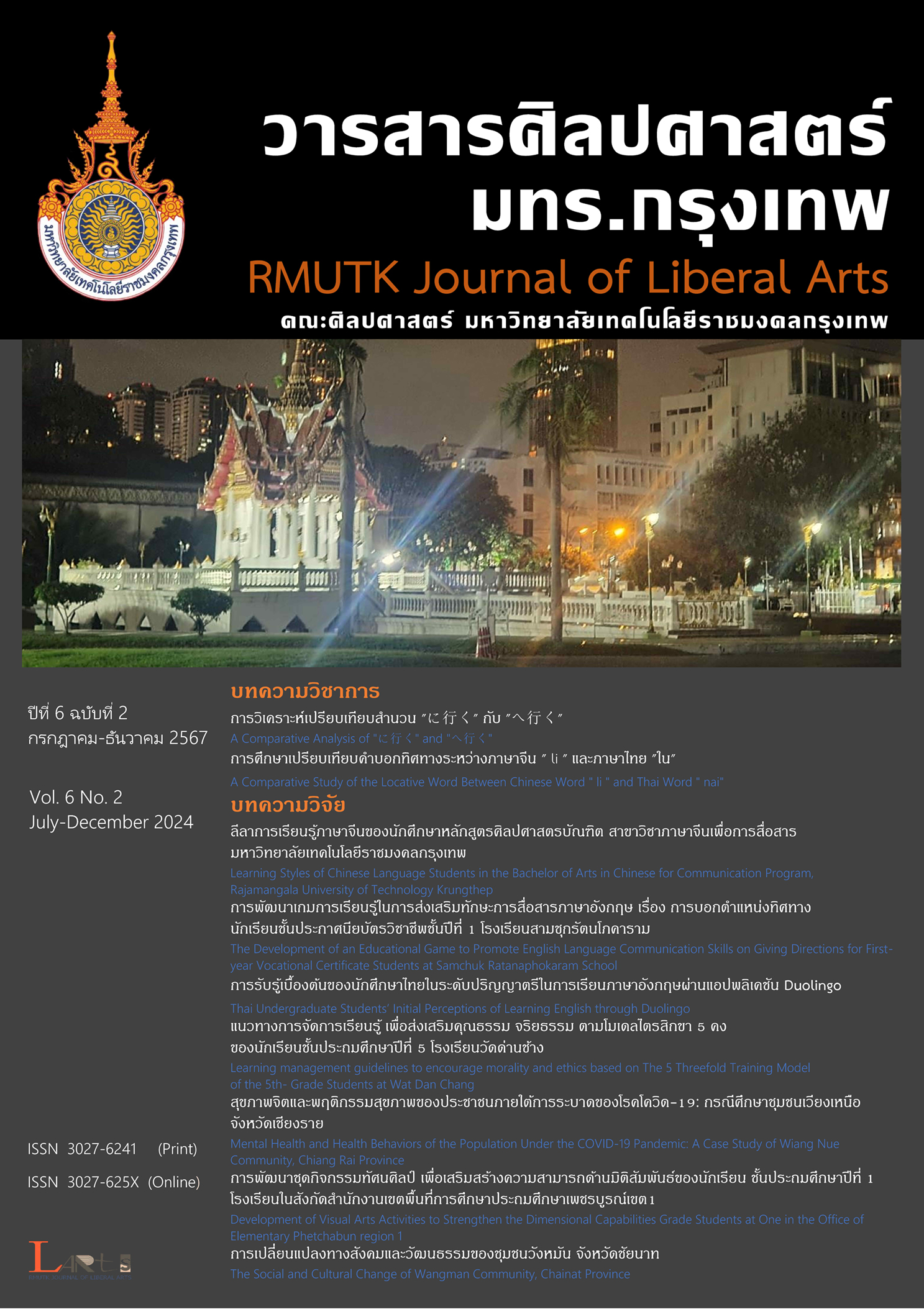The Development of an Educational Game to Promote English Language Communication Skills on Giving Directions for First-year Vocational Certificate Students at Samchuk Ratanaphokaram School
Main Article Content
Abstract
The objectives of this research are as follow: 1) to develop an educational game to promote English Language communication skills, specifically focusing on giving directions for first-year vocational certificate students at Samchuk ratanaphokaram School. 2) to compare the communication skills in real-life English language classes of students taught using traditional methods (control group) with those taught using the educational game (experimental group). 3) to study the feedback on the educational game for teaching directional language in English language classes from students. The sample group consists of first-year vocational certificate students from Samchuk Rattanaphokaram School, second semester, academic year 2023, totaling 40 individuals. The simple random sampling method was used to divide them into two groups: experimental and control, through randomization. The research tools include the educational game for promoting communication skills, specifically giving directions, and a test measuring learning outcome regarding directional language. This test consists of 20 multiple-choice questions. Statistical analysis used in this research includes mean, standard deviation, and t-test. The research found that there was a significant improvement in learning outcomes for students taught using the educational game to promote English language communication skills, specifically in giving directions. The experimental group outperformed the control group, with the post-test scores showing a statistically significant difference (t=7.31, Sig.=.00). Additionally, the experimental group expressed significantly higher satisfaction with learning English through the educational game (X̅ = 4.43, S.D.=0.19).
Article Details

This work is licensed under a Creative Commons Attribution-NonCommercial-NoDerivatives 4.0 International License.
References
ครูบ้านนอกดอทคอม .“หลักการสอนโดย โรเบิร์ต กาเย่ (Robert Gange).” https://www.kroobannok.com/createpdf.php?article_id=92, 21 กุมภาพันธ์ 2567
จิรกรณ์ ศิริประเสริฐ. (2541). ความแตกต่างทางเพศในเกมและกิจกรรมพลศึกษาสำหรับเด็ก. วารสารวิทยาศาสตร์การออกกำลังกายและกีฬา, 2(1), 79-85
ทิศนา แขมมณี. (2550). ศาสตร์การสอนองค์ความรู้เพื่ออการจัดกระบวนการเรียนรู้ที่มีประสิทธิภาพ. สํานักพิมพ์แห่งจุฬาลงกรณ์มหาวิทยาลัย.
บัวทอง พรมโส. (2552). ผลของการใช้เกมที่มีต่อทักษะการพูดภาษาอังกฤษของนักเรียนชั้นประถมศึกษาปีที่ 3 โรงเรียนบ้านหินเหิบศิลาทิพย์ จังหวัดของแก่น. [วิทยานิพนธ์ศึกษาศาสตรมหาบัณฑิต]. แขนงวิชาหลักสูตร และการสอน
สาขาวิชาศึกษาศาสตร์ มหาวิทยาลัยสุโขทัยธรรมาธิราช.
ปรียานุช บัวผัน, และสุนีตา โฆษิตชัยวัฒน์. (2565). ผลการใช้กิจกรรมเกมกระดานเพื่อส่งเสริม ทักษะการพูดภาษาอังกฤษของนักเรียนระดับชั้นมัธยมศึกษาปีที่ 1. มหาวิทยาลัยศิลปากร.
พัทธนันท์ อินทสิทธิ์, ฟาริดา เกิดเปลี่ยน, วรวัตร ประสาททอง, และสิรภัทร จันทะมงคล. (2566). การพัฒนาบทเรียนออนไลน์โดยใช้ Google Site เรื่องคำศัพท์งานช่างเฉพาะทาง เพื่อสร้างเสริมความสามารถในการจำคำศัพท์ภาษาอังกฤษพื้นฐานในงานอุตสาหกรรมของนักศึกษาหลักสูตรครุศาสตร์อุตสาหกรรมบัณฑิต สาขาวิชาวิศวกรรมอุตสาหการ คณะครุศาสตร์อุตสาหกรรม มหาวิทยาลัยเทคโนโลยีราชมงคลสุวรรณภูมิ ศูนย์สุพรรณบุรี.มหาวิทยาลัยเทคโนโลยีราชมงคลสุวรรณภูมิ ศูนย์สุพรรณบุรี.
มณฑาทิพย์ อัตตปัญโญ. (2542). การใช้เกมพัฒนาทักษะการเขียนสะกดคำสำหรับนักเรียน ชั้นประถมศึกษาปีที่ 3. โรงเรียนสาธิตมหาวิทยาลัยเกษตรศาสตร์วิทยาเขตกำแพงแสน จังหวัดนครปฐม. [ปริญญานิพนธ์ปริญญามหาบัณฑิต]. มหาวิทยาลัยศรีนครินทรวิโรฒประสานมิตร.
วิลาวัลย์ อินทร์ชำนาญ. (2561). การพัฒนาสื่อการเรียนรู้ประเภทเกม เพื่อให้ความรู้ในเรื่องกฎระเบียบและข้อปฏิบัติในศูนย์ฝึกและอบรมเด็กและเยาวชน. รายงานการวิจัย มหาวิทยาลัยธุรกิจบัณฑิตย์.
สิริฐิติ สรหงษ์. (2567). ผังเกมการเรียนรู้เรื่อง การบอกตำแหน่งทิศทาง (Directions) และตัวอย่างการ์ดคำถาม เรื่อง การบอกตำแหน่งทิศทาง (Directions). มหาวิทยาลัยเทคโนโลยีราชมงคลสุวรรณภูมิ ศูนย์สุพรรณบุรี.
สิริวรรณ โพธิ์ทอง, และวนิดา อัญชลีวิทยกุล. (2559). การใช้การสอนแบบการเล่าเรื่องเพื่อพัฒนาทักษะการพูดภาษาอังกฤษของนักเรียนชั้นประถมศึกษาปีที่ 6. รายงานการวิจัย มหาวิทยาลัยสวนดุสิต.
อรทัย ชินาภาษ. (2560). การพัฒนารูปแบบการสอนตามแนวคิดการสร้างองค์ความรู้ตามแนวทฤษฎีคอนสตรัคติวิสต์เพื่อพัฒนาผลสัมฤทธิ์ทางการเรียน กลุ่มสาระการเรียนรู้คณิตศาสตร์ สำหรับนักเรียนชั้นประถมศึกษาปีที่ 1.โรงเรียนเมืองเดช สำนักงานเขตพื้นที่การศึกษาประถมศึกษาอุบลราชธานี เขต 5 สำนักงานคณะกรรมการการศึกษาขั้นพื้นฐาน. กระทรวงศึกษาธิการ
Preedakorn, Auttasead. (2014). Design A Boardgame to Study Colour Circle for Students in Grade 6. [Master Thesis, M.Ed. Art Education]. Graduate School, Srinakharinwirot University.
Bloom, B.S. (Ed.). Engelhart, M.D., Furst, E.J., Hill, W.H., & Krathwohl, D.R. (1956). Taxonomy Of Educational Objectives, Handbook I: The Cognitive Domain. David McKay Co Inc.
Khammani, T. (2012). Teaching science: knowledge for the learning process effective. (18 ed.). Chulalongkorn University Press. (in Thai)
Yiemkuntitavorn, S. (2017). English Instruction through Information and communication technologies in 21 century. Journal of Rangsit University Teaching and Learning, 11(1), 123-134. (in Thai)


